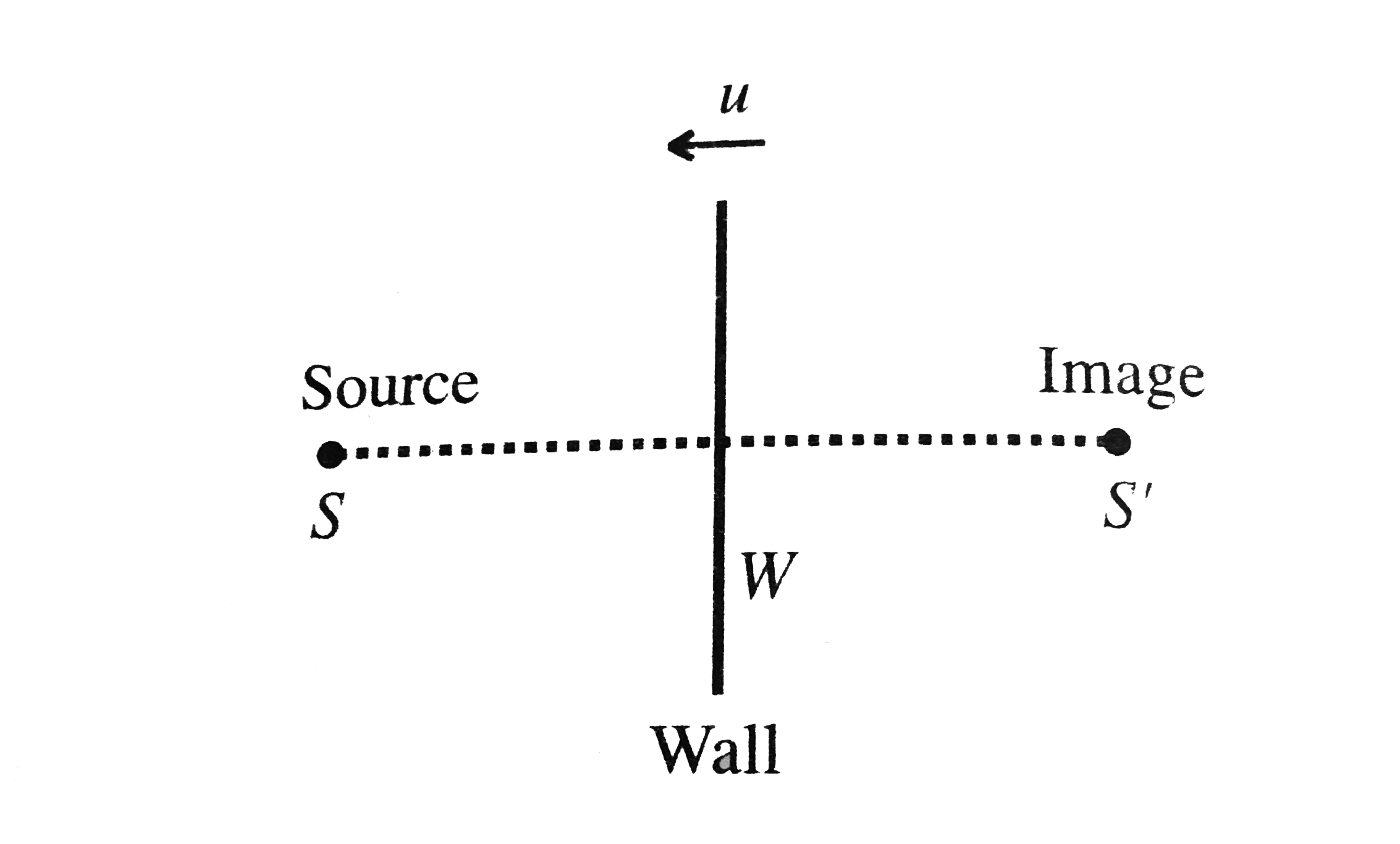Sound waves of frequency 600HZ fall normally on perfectly reflecting wall. The distance from the wall at which the air particles have the maximum amplitude of vibration is (speed of sound in air = 330m/s)
The correct Answer is:A, B
Wall will be a node (displacement). Therefore,
shortest distance from the wall at which air
particles have maximum amplitude of vibration
(displacement antinode) should be λ4.
Here, λ=vf=330660=0.5m
∴Desireddistanceis0.5/4 = 0.125 m.
Topper's Solved these Questions
- SUPERPOSITION OF WAVESBOOK - DC PANDEYCHAPTER - SUPERPOSITION OF WAVESEXERCISE - Exercise 18.4
3 Videos
- SUPERPOSITION OF WAVESBOOK - DC PANDEYCHAPTER - SUPERPOSITION OF WAVESEXERCISE - Level 1 Assertion And Reason
10 Videos
- SUPERPOSITION OF WAVESBOOK - DC PANDEYCHAPTER - SUPERPOSITION OF WAVESEXERCISE - Exercise 18.2
4 Videos
- SOUND WAVESBOOK - DC PANDEYCHAPTER - SOUND WAVESEXERCISE - Exercise 19.7
4 Videos
- THERMOMETRY THERMAL EXPANSION AND KINETIC THEORY OF GASESBOOK - DC PANDEYCHAPTER - THERMOMETRY THERMAL EXPANSION AND KINETIC THEORY OF GASESEXERCISE - Medical entrance gallary
30 Videos
Similar Questions
Sound waves of frequency 660Hz fal normally on a perfectly reflecting wall. The shortest distance from the wall at which the pair particles have maximum amplitude of vibration is ……………… meters.
View SolutionA sound wave of frequency 660 Hz incidents normally on a perfectly reflecting object. If the speed of sound in air is 330ms−1, what is the shortest distance from the wall at which the wave particles have (a) the maximum and (b) the minimum displacement gt
View Solution
Knowledge Check
Sound waves of frequency 660 Hz fall normally on a perfectly reflecting wall. The shortest distance from the wall at which the air particle has maximum amplitude of vibration is (velocity of sound in air is 330m/s)
A0.125mB0.5mC0.25mD2mSound waves of v=60Hz fall normally on a perfectly reflecting wall. The shortest distance from the wall at which all particles will have maximum amplitude of vibration will be (Given, speed of sound =300ms−1)
A78mB38mC18mD14mDistance travelled by the sound produced by a tuning fork of frequency 50 Hz completing 200 vibrations is, (the velocity of sound in air is 330 m/s)
A1100 mB3300 mC660 mD1320 m
A sound wave of frequency 660 Hz incidents normally on a perfectly reflecting object. If the speed of sound in air is 330ms−1, what is the shortest distance from the wall at which the wave particles have (a) the maximum and (b) the minimum displacement gt
View SolutionA sound wave of frequency 660 Hz incidents normally on a perfectly reflecting surface. If the speed of sound in air is 330ms−1, what is the time taken by a particle in the medium to complete one vibration? Determine the wave length of the wave.
View SolutionA sound wave of frequency 660 Hz incidents normally on a perfectly reflecting surface. If the speed of sound in air is 330ms−1, what is the time taken by a particle in the medium to complete one vibration? Determine the wave length of the wave.
View SolutionA sound wave of frequency 660 Hz incidents normally on a perfectly reflecting object. If the speed of sound in air is 330ms−1, what is the shortest distance from the wall at which the wave particles have (a) the maximum and (b) the minimum displacement gt
View Solution A driver in a stationary car horns which produces monochromatic sound waves of frequency n=1000Hz, normally towards a reflecting wall. If the wall approaches the car will a velocity u=3.3ms, calculate the frequency of sound reflected from wall and heard by the driver. What is the percentage change of sound frequency of reflection from the wall?
A driver in a stationary car horns which produces monochromatic sound waves of frequency n=1000Hz, normally towards a reflecting wall. If the wall approaches the car will a velocity u=3.3ms, calculate the frequency of sound reflected from wall and heard by the driver. What is the percentage change of sound frequency of reflection from the wall?
View Solution